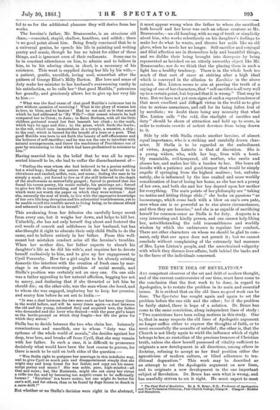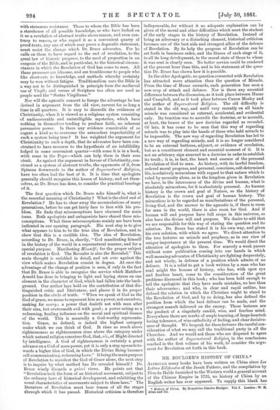THE TRITE IDEA OF REVELATION.*
ANY competent observer of the set and drift of modern thought, and of the current controversies of our time, must have come to the conclusion that the first work to be done, in regard to Apologetics, is to restate the problem in its main and essential issues. It is evident that on the old lines no good work can be done. The Spectator has sought again and again to set the problem before the one side and the other; for if the problem be fairly stated, there is hope of a solution. Dr. Bruce has come to the same conviction, along independent lines of study : "Two convictions have been ruling motives in this study. One is, that in many respects the old lines of Apologetic argument no longer suffice either to express the thoughts of faith, or to meet successfully the assaults of unbelief; the other is, that the Church is not likely again to wield the influence which of right belongs to her, as custodian of the precious treasure of Christian truth, unless she show herself possessed of vitality sufficient to. originate a new development in all directions, among others irr doctrine, refusing to accept as her final position either the agnosticism of modern culture, or blind adherence to tra- ditional dogmatism." This work may be described as an attempt to set the Apologetic argument on new lines,. and to originate a new development in the one important subject of Revelation. Dr. Bruce has seen what is wrong, and has manfully striven to set it right. He must expect to meet * Th. Chief End of Revelation. By A. B. Bruce, D.D., Professor of Apologetics. and New-Testament Criticism, Free Church College, Glasgow. Glasgow; Hodder and Stoughton.
with strenuous resistance. Those to whom the Bible has been a storehouse of all possible knowledge, or who have looked on it as a revelation of abstract truths above reason, and even con- trary to reason, or who regard it as a convenient quarry of proof-texts, any one of which may prove a dogmatic statement, must resist the change which Dr. Bruce advocates. For he calls on them to have regard to the end of revelation, to the great law of historic progress, to the need of proportion in an exegesis of the Bible, and in particular, to the historical circum- stances in which the Revelation of God has come to man. All these processes are irksome, and are troublesome to people who like short-cuts to knowledge, and methods whereby certainty may be won without fatigue. Traditionalism uses the Bible in a way not to be distinguished in principle from the mediseval use of Virgil ; and verses of Scripture too often are used as people used the " Sortes Virgilianse."
Nor will the agnostic consent to forego the advantage he has derived in argument from the old view, current for so long a time in all quarters. It is easy to discredit the evidences of Christianity, when it is viewed as a religious system consisting of undiscoverable and unintelligible mysteries, which have nothing in themselves tending to produce faith, no inherent persuasive power. Is there any evidence conceivable of so cogent a kind as to overcome the antecedent improbability of such a system being true ? It has weighted the argument for Christianity to such a depth, that its advocates have been con- strained to have recourse to the hypothesis of an infallibility lodged in some convenient quarter—with some it is in a book, with some in the Pope—which can help them in their sore strait. As against the argument in favour of Christianity, con- strued as a system of abstract truths, the opponents of it, from Spinoza downwards to the author of Supernatural Religion, have too often had the best of it. It is time that apologists generally should recognise this lesson of history, and set them- selves, as Dr. Bruce has done, to consider the practical bearings of it.
The first question which Dr. Bruce asks himself is, what is the essential meaning of Christianity ? What is the chief end of Revelation P He has to clear away the accumulations of many generations, before he can get fairly face to face with his pro- blem. He finds that misconceptions have obscured the main issue. Both apologists and antagonists have shared these mis- conceptions. Who.% these misconceptions mainly are have been indicated in our opening paragraph. His next step is to give what appears to him to be the true idea of Revelation, and to show that this is a credible idea. The idea of Revelation, according to Dr. Bruce, is, shortly, "God manifesting himself in the history of the world in a supernatural manner, and for a special purpose. Manifesting Himself; for the proper subject of revelation is God. The Revealer is also the Revealed." This main thought is unfolded in detail, and set over against the view which makes Revelation consist in dogma. At once the advantage of the change of position is seen, if only in the fact that Dr. Bruce is able to recognise the service which Matthew Arnold has done in bringing to light and laying stress on one element in the character of God, which had fallen into the back- ground. Our author lays bold on the contribution of that dis- tinguished critic and litterateur, and places it in its proper position in the circle of truth. "When we speak of God as the God of grace, we mean to represent him as a power, not ourselves, snaking for mercy; a power that dealeth not with man after their sins, but overcometh evil with good ; a power acting as a redeeming, healing influence on the moral and spiritual disease of the world. This is assuredly a God-worthy representa- tion. Grace, as defined, is indeed the highest category under which we can think of God. It rises as much above righteousness as righteousness rises above the category under which natural religion conceives God, that, viz., of Might directed by intelligence. A God of righteousness is certainly a great advance on a Cod of mere power, yet it is only a step upwards to- wards a higher idea of God, in which the Divine Being becomes self-communicating, redeeming Love." It being the main purpose of Revelation to manifest the God of Grace alone, the next step is to inquire by what method has Be revealed himself ? Dr.
Bruce wisely discards a priori views. He points out that "Revelation took the form of an historical movement, subject to
the ordinary laws of historical development, and exhibiting the usual characteristics of movements subject to these laws." The literature of Revelation must bear traces of all the stages through which it has passed. Historical criticism is therefore indispensable, for without it no adequate explanation can be given of the moral and other difficulties which meet the student of the early stages in the history of Revelation. Instead of being an adversary or a disturbing element, historical criticism becomes one of the best aids and strongest allies of the defence of Revelation. By its help the progress of Revelation can be set forth in luminous order, and the fitness of each stage of it, in all its long development, to the moral state of those to whom it was sent is clearly seen. No better service could be rendered at the present hour than this, and in his statement of the ques- tion Dr. Bruce has shown how it is possible.
In the older Apologetic, no question connected with Revelation has attracted more attention than the question of Miracle. From the time of Hume onwards, each generation has seen a new crop of attack and defence. Nor is there any essential difference between the discussion, as it took place between Hume and Campbell, and as it took place between Canon Mozley and the author of Supernatural Religion. The old difficulty is stated in the old way, and until very recently on all bands miracle was considered as external, accidental, and evidential only. Its function was to accredit the doctrine, or to accredit, at least, the bearer of the new doctrine regarded as revealed. Of late, it has come to be seen that this way of regarding miracle was to play into the hands of those who held miracle to be impossible. The new way of regarding Revelation has led to a new way of regarding miracle, and it is no longer considered to be an external buttress, adjunct, or evidence of revelation, but as a constituent element and essential moment of it. It is not an arbitrary sign annexed to a doctrine in order to establish its truth ; it is, in fact, the heart and essence of the personal Revelation of God to man. As history, with its lawful freedom, ordered moral progress, and personal, conscious, self-determined life, is relatively miraculous with regard to that nature which is ruled by necessity alone, so in the kingdom given in Revelation we have, in the intercourse of the divine and human, what is absolutely miraculous, for it is absolutely personal. As human history is the crown and goal of Nature, so the history of Revelation is the crown and goal of human history. The miraculous is to be regarded as manifestations of the personal, living God, and the answer to the agnostic is, if there is room for man in the world, there is also room for God. And if human will and purpose have full scope in this universe, so also have the divine will and purpose. We desire to add that we are responsible for this way of stating the question and its solution. Dr. Bruce has stated it in his own way, and given his own solution, with which we agree. We direct attention to the two lectures on miracle and prophecy, as in our view of unique importance at the present time. We would direct the attention of apologists to them. For scarcely a week passes without some publication coming into our hands in which well-meaning advocates of Christianity are fighting desperately, and not wisely, in defence of a position which admits of no defence. It is a relief to get a book written by a man who has read aright the lessons of history, who has, with open eye and fearless heart, come to the consideration of the great problems discussed in this book ; who has been bold enough to tell the apologists that they have made mistakes, no less than their adversaries ; and who, in clear and rapid outline, has defined the relation in which the Christian ought to stand to the Revelation of God, and by so doing, has also defined the position from which the best defence can be made, and the strongest assault delivered on the enemy. These lectures are the product of a singularly candid, wise, and fearless mind. Everywhere there are marks of ample learning, of large-hearted, loving tolerance, of wise catholicity of feeling, and clear decisive- ness of thought. We bespeak for these lectures the careful con- sideration of what we may call the traditional party in all the Churches. And we would ask those who are disposed to agree with the author of Supernatural Religioa,. in the conclusions reached in the first volume of his work, to consider the argu- ment for Revelation set forth in this book.



































 Previous page
Previous page